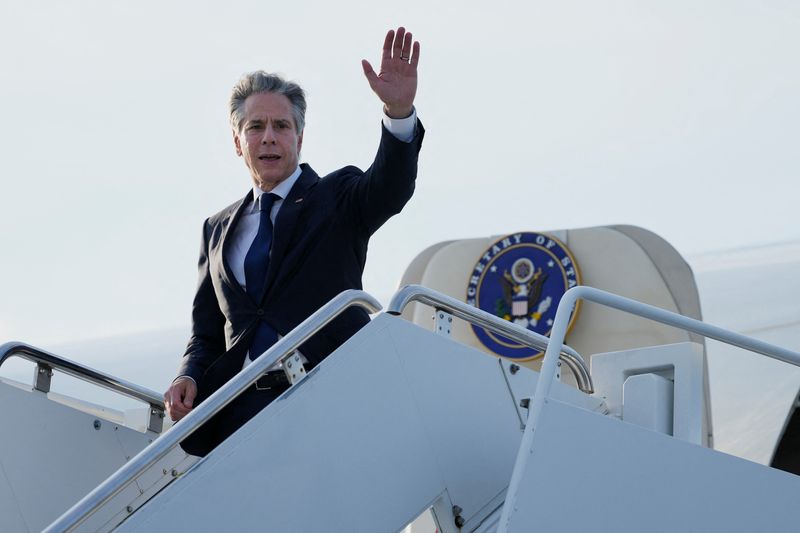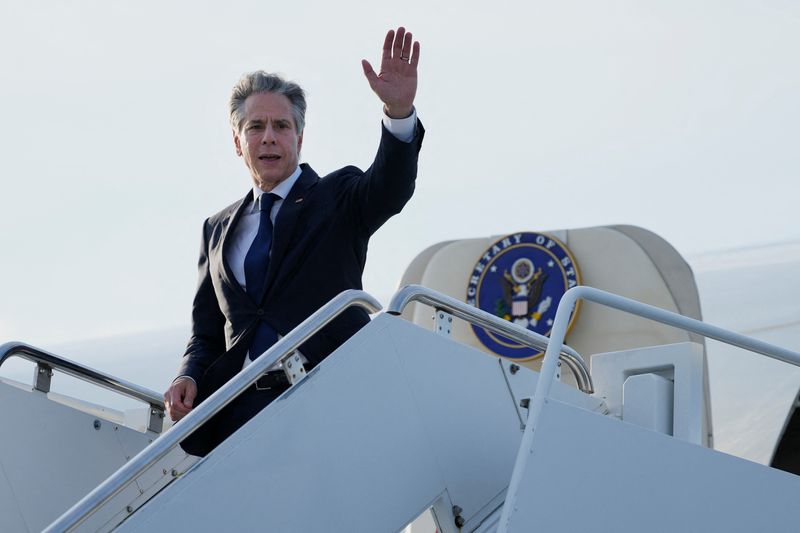
By David Brunnstrom, Simon Lewis (JO:LEWJ) and Trevor Hunnicutt
WASHINGTON (Reuters) – U.S. President Joe Biden’s decision to block Nippon Steel’s $14.9 billion bid for U.S. Steel casts a shadow over Secretary of State Antony Blinken’s visit to Japan on Tuesday for farewell meetings with Washington’s most important ally in Asia.
The rejection, announced on Friday, has jolted U.S. efforts to boost ties with Asian allies just as South Korea’s political crisis potentially complicates a revived relationship between Washington, Seoul and Tokyo. The trilateral alliance is a key plank in the countries’ efforts to counter China’s military buildup.
Investment into the U.S. could also be chilled, but analysts say any damage to the wider U.S.-Japan relationship will likely be limited given shared security concerns about China.
The State Department said Blinken will meet with senior Japanese government officials on Tuesday to review “the tremendous progress the U.S.-Japan alliance has made over the past few years.”
He would “reaffirm the importance of the alliance in addressing a range of bilateral, regional, and global issues and continue to build on the momentum of U.S.-Japan-ROK trilateral cooperation,” it said, using the initial of South Korea’s official name, the Republic of Korea.
In Seoul on Monday, Blinken reaffirmed confidence in South Korea’s handling of its political turmoil as investigators there sought an extension of a warrant to arrest impeached President Yoon Suk Yeol.
Allies of U.S. President-elect Donald Trump have also reassured Seoul and Tokyo that he will support continuing to improve their once-icy ties and advance military, economic and diplomatic cooperation to counter China and North Korea, Reuters reported ahead of Trump’s Nov. 5 reelection.
TENSION, LIMITED DAMAGE FROM NIPPON STEEL DECISION
Nippon Steel and U.S. Steel filed a lawsuit on Monday charging that Biden violated the U.S. Constitution by blocking their $14.9 billion merger through what they termed a sham national security review. They called for the U.S. federal court to overturn the decision.
Nicholas Szechenyi, a Japan expert at Washington’s Center for Strategic and International Studies, said Biden’s decision would make Blinken’s Tokyo visit “awkward.”
However, “Japan won’t let the Nippon Steel decision poison the U.S.-Japan relationship; it’s too important for Japan’s national security,” he said.
A Japanese diplomat told Reuters Biden’s decision could chill foreign direct investment, but hoped close U.S.-Japan relations would continue, with a strong emphasis on reestablishing the strong ties with Trump seen during his previous administration, and taking advantage of the increasingly hawkish mood in Washington on China.
Business lobbies in both Japan and the U.S. pushed hard for the merger, backing their arguments with warnings about the effect on the vital U.S.-Japan relationship.
But the merger faced opposition from both Biden and Trump, who takes office on Jan. 20 and was assiduously courted by Japan in the run up to his reelection.
Trump reiterated after his reelection that he was “totally against” the merger and vowed to block it as president and support U.S. Steel with tax breaks and tariffs.
A former senior official in Trump’s first administration told Reuters he believed Trump would have taken the same approach as Biden.
Marc Busch, a fellow at Georgetown University’s McDonough School of Business, forecast “significant fallout” for U.S. efforts to work with allies to create resilient supply chains in the face of Chinese dominance or competition in key areas.
“Japan and other allies will have doubts about investing in or aligning with politically sensitive U.S. supply chains. China must be chuckling to itself that it could never have hoped for a better outcome.”

